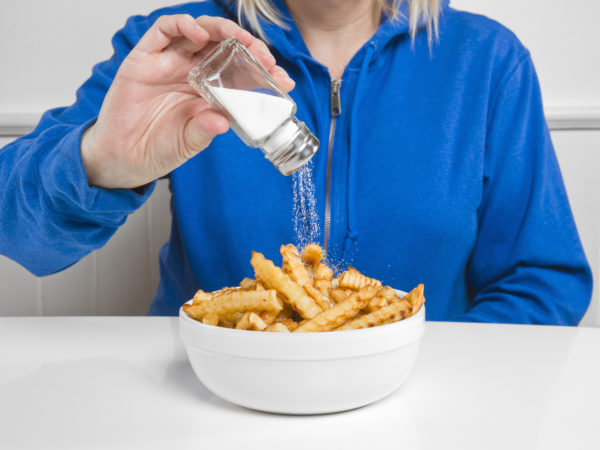High Blood Pressure Protection?
I eat a fairly healthy diet with lots of fruits and vegetables. I was surprised to learn I have high blood pressure. Aren’t fruits and vegetables protective?
Andrew Weil, M.D. | May 29, 2018

Eating plenty of fruits and vegetables might help protect against high blood pressure (hypertension), but results of an investigation published in March 2018 concluded that an otherwise healthy diet can’t counteract the effect of high salt intake.
This latest finding emerged from research conducted by a team from a number of institutions including Imperial College London in the UK and Northwestern University in the U.S. The investigators reviewed data collected between 1997 and 1999 from 4,680 men and women aged 40 to 59 from the US, the UK, Japan and China. They considered information on the participants’ height, weight and blood pressure, as well as their diets and concentrations of sodium and potassium in their urine. They also analyzed their reported consumption of more than 80 nutrients– proteins, fats, vitamins, minerals and amino acids, in particular, those associated with lower blood pressure: vitamin C, fiber, omega-3 fatty acids, and potassium (found in leafy green vegetables). Salt intake was estimated by measuring levels of sodium in urine.
The outcome was that high salt consumption was connected to high blood pressure even among people whose diets provided plenty of potassium and other protective nutrients.
The team reported that the average salt intake among the study participants was 10.7 grams per day. The average intake in the U.S. was 9.6 grams and in the UK was 8.5 grams. For the Chinese participants it was 13.4 grams and for the Japanese, 11.7 grams.
That’s too much. The World Health Organization, the American Heart Association and other health agencies recommend limiting daily sodium consumption to between 1.5 grams and 2.3 grams (the amount in one teaspoon). The average daily consumption in the United States these days is about 3.4 grams.
It’s estimated that about 80 percent of the salt in the Western diet comes from prepared, packaged, processed foods such as crackers, cookies, cereals, soups, frozen dinners, and pasta sauces eaten at home. More comes from fast foods and other restaurant meals, not from amounts used in cooking or at the table at home. The researchers advised people to lower their salt consumption and called upon food manufacturers to reduce the salt content of their products.
Hypertension is the most common risk factor for cardiovascular disease in the U.S., affecting one in three adults. Untreated hypertension can damage arteries and impair blood flow to vital organs, raising risks of heart attack, kidney failure, stroke, eye damage or aneurysm.
While the exact cause of high blood pressure often can’t be pinpointed, contributing factors, in addition to excessive salt consumption, include stress, excess water retention, deficiencies of calcium, magnesium and potassium; insulin resistance, kidney damage, excessive alcohol intake, being overweight and certain medications. You can learn more about the symptoms, causes, and treatment of high blood pressure here.
Andrew Weil, M.D.
Source:
Jeremiah Stamler and Queenie Chan et al, “Relation of Dietary Sodium (Salt) to Blood Pressure and Its Possible Modulation by Other Dietary Factors.” Hypertension, March 5, 2018; DOI: 10.1161/HYPERTENSIONAHA.117.09928











